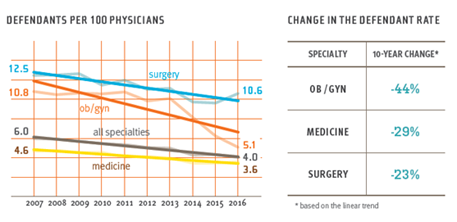Newsletter
Some Good News about Medical Malpractice in America
Mar 04, 2019
Emotion is a great motivator, but a poor research assistant.
In the realm of medical errors, the knowledge of what happened to one patient (no matter how tragic), or one physician (no matter how distraught), is rarely enough to understand the systemic risks underlying adverse events… or to guide meaningful change. To appropriately honor an emotional response to a single adverse event, health care leaders must also determine what goes wrong repeatedly, gauge concerning trends, spot emerging risks, and compare that information over time and across peer groups. And then take actions that will make a significant difference.
Twenty years ago, CRICO Strategies’ national Comparative Benchmarking System (CBS) was developed to gain those types of insights. Today, CBS represents 30 percent of U.S. malpractice cases, the industry’s most robust coding taxonomy, and risk-related data unavailable elsewhere. Drawing on that unique source, the recently published report, Medical Malpractice in America: A 10-year Assessment with Insights, explores the power of that database.
Defendant rates declined most steeply in obstetrics/gynecology
These declines correlate with long-term safety interventions in these areas.
Among the findings in this 28-page Report, covering 2007–2016: a 27 percent drop in the frequency of malpractice claims and suits being asserted, with downward trends in the rate of cases per 100 physicians across virtually all specialties.
Myriad factors contribute to this trend: not all are apparent, but it is reasonable to assume that the patient safety movement, largely spurred on by the IOM’s 1999 To Err is Human report, is having a substantial impact on medical errors, adverse events, and malpractice cases. Many of the research and remedies behind the success to date were informed by CBS and other sources that help pinpoint chronic underlying risks. Certainly, there is much more to be done to improve health care safety, and those efforts will require both passion and actionable data.
Download the Medical Malpractice in America report.
Latest News from CRICO
Postpartum Malpractice Claims: Can We Understand Preventable Harms and Socioeconomic Factors?

Establishing a Regional Registry for Neonatal Encephalopathy: Impact on Identification of Gaps in Practice
The Safety of Inpatient Health Care


